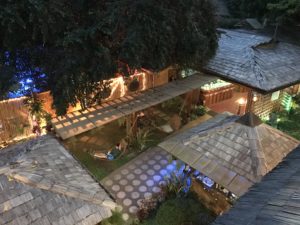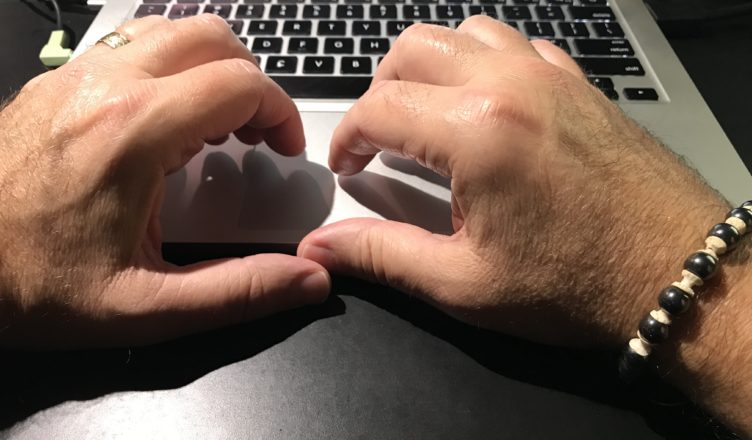A Travel Essay
Watching a presidential press conference the other day, I began to wonder, what brings about the collapse of a society?
I’ll tell you what would do it: if something were to happen to our population of garbage collectors. Without efficient trash collection, I’d give us six months, tops. So, God bless all you garbage men (and women) out there. Thanks for your service, and stay healthy.
I think it pretty safe to self-assess that we’re “well traveled”, and I’ve had plenty of opportunity lately to reflect on our travels. On some mornings I put on one particular black pearl and shark spine bracelet. As I tighten the the strings with my teeth, and when it catches my glances as I type away at work, memories flood back.
Palawan. It’s a 300-mile long tropical island in the Philippines. We spent two weeks there in January of last year (2017). Click the link at the beginning of this paragraph to read my blog, I think it’s one of my better ones.
Of all the possible memories—the underground river, Honda Bay and hundreds of chocolate chip starfish, the trikes, the food—the one that comes back to me the most, triggered by this bracelet, perhaps the cheapest travel trinket I’ve ever acquired, is of a man I encountered once, whose name I didn’t learn, and who didn’t speak a language in common with me.
Our thatch-roofed hotel was u-shaped, a safe haven in the middle of the town of Puerto Princesa with a bar set in its middle. From the moment we arrived, that little bar, with a grand total of 4 wicker bar stools, became one of our favorite spots discovered in our travels. They served cold bottles of beer for about fifty cents and simple drinks mixed from a very limited supply of juices and spirits, rarely the same offering one day to the next. There’s something soul-soothing to sipping cold beers in hot, humid air under palm trees at an open-air bar.

We spotted him, and he spotted us, on day one in Palawan the first time we enjoyed a beer at the bar. He stood just outside the open end of the hotel ten yards away, not daring to cross some imaginary line established by the hotel management. He was one of those guys selling junk, the guys who harass you as you sip your wine in a square in Europe, like the women shoving unwanted snips of herbs or the men pushing cheap little metal Eiffel Towers in your face.
He held up a white plastic box for me to see, not realizing I couldn’t see anything in his little box from that far away, not without my glasses. But I could make out his forced, toothless grin, and as I tried to nonchalantly ignore him, I mentally thanked the management for setting the rule that kept him at a comfortable distance.
A couple of days later, he was back. And a couple of days after that he had a little boy with him. Same forced, toothless smile, same little box of whatever, same imaginary line. The boy played here and there, as boys of six or seven do, poking rocks and things with a stick and rooting around in the landscaping. I tried to ignore them, but once, between beers, I glanced over to see the boy offering the little plastic box for me to see, the man prodding him to smile at us. He was teaching his son the “family business”.
Every couple of days, the man returned, and I successfully ignored him. I never saw the boy with him after that one time. And toward the end of our visit, as we walked back from dinner out or a trike ride or some other less memorable touring, the man stood there dutifully, smiling toothlessly and eagerly, politely a few feet to our side, earnestly showing me his little box of wares.
I’m a savvy enough traveler to know that if I stop, if I show interest, it becomes infinitely harder to walk away. So the moment I caved, I knew—unless he asked some ridiculous price for whatever it was—I was going to have to buy something. But what I wound up paying for was not really what he was selling.
The moment I paused and faced him, his smile was genuine, no longer forced. He knew he had me. He squatted to set his box on the ground and show me what he had to sell. They were bracelets of black coral, fish and shark bones, and beads. We squatted down with him.
He spoke Tagalog, and not much English. Except numbers of pesos. Yet he was able to convey to me that he had made them, pantomiming how he had sewn the beads and bones together, that they had come from the water, how he had tied the knots. He offered to put one on our each of our wrists, and we tried a few on.
I attempted, unsuccessfully, to ask about his boy. I suppose he thought I was trying to tell him the surrounding trees were short, or that I wanted him to poke at the landscaping with sticks. I gave up after a couple of tries and asked “how much”, indicating the bracelets Lori and I wore. He understood that bit of English.
Two hundred pesos, he replied. That came out to less than four dollars. I could swing that. Except there was one problem: the smallest bill I had was a thousand pesos. No worries, the hotel could break it for me.
But as I stood to go break my bill, he panicked. I couldn’t convey to him that I wasn’t reneging and walking off, that I was only going to make change. His offer doubled: he handed us two more bracelets. Then another. My heart surged for that man in that moment, and I handed him the thousand peso bill. I think he finally understood, as he didn’t have change either. He looked toward the desk, wondering if they’d let him approach and make change. I caught his eye, smiled, and made the universal gesture that he just keep the money. He seemed surprised when I offered him my hand, but he shook it with a pleasant, toothless, smile.
He didn’t come back to the hotel, at least not the few remaining days we were still there. We imagine he retired, at least for a few days. It’s this story that plays through my mind whenever I tighten the little strings of my bracelet with my teeth. I like my bracelet, it’s pretty cool. But my twenty-ish dollars weren’t really spent on the trinket, it was the five minute experience that I most gained in our transaction. And I got it for a steal. I hope my friend in Palawan and his little boy are doing well.
So what actually could bring about the collapse of society? It’s simple. The lack of empathy.






